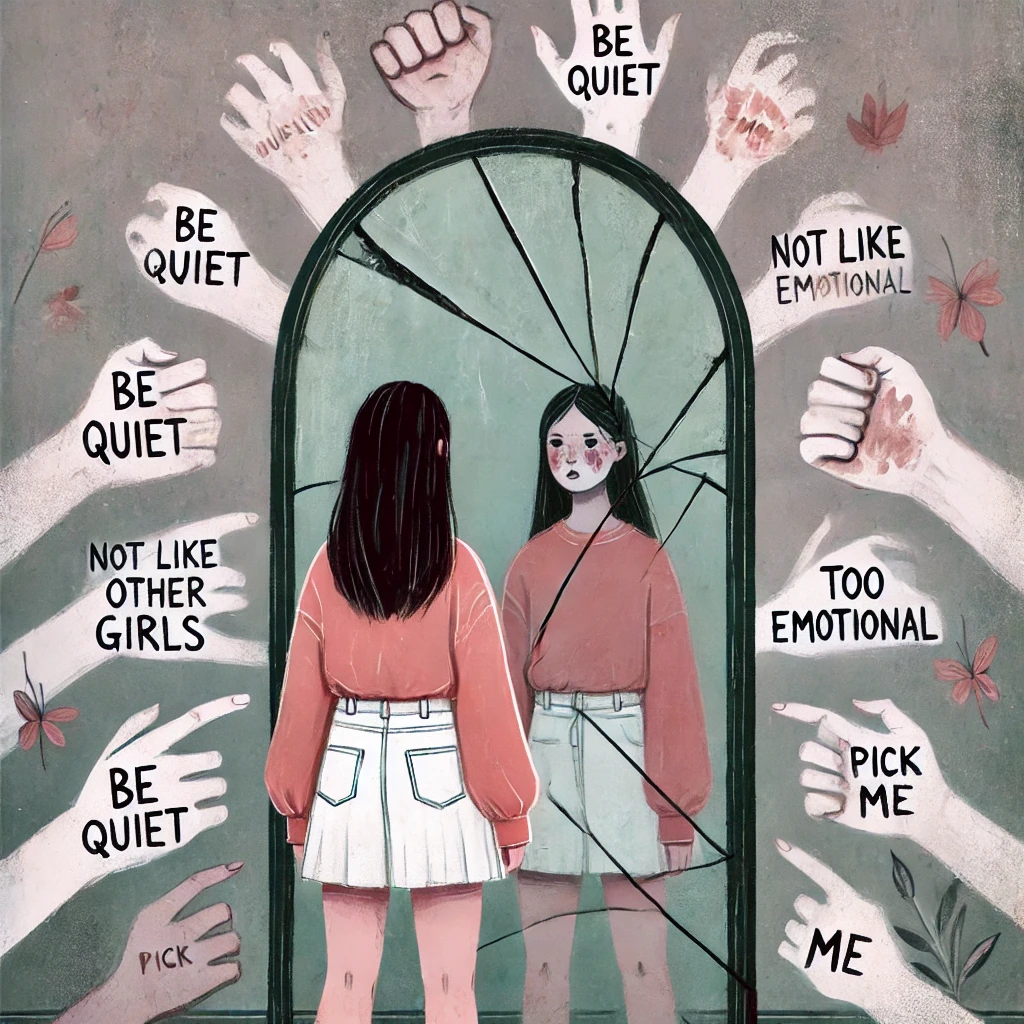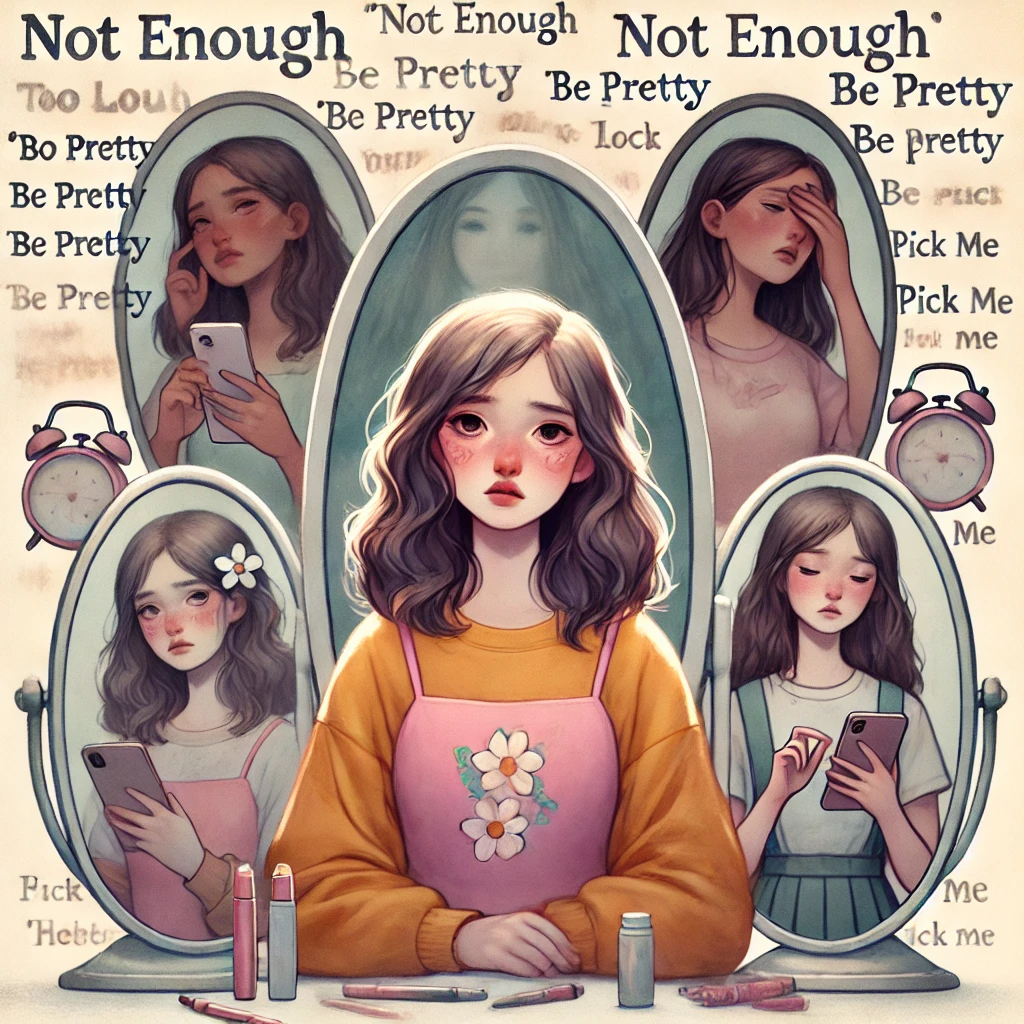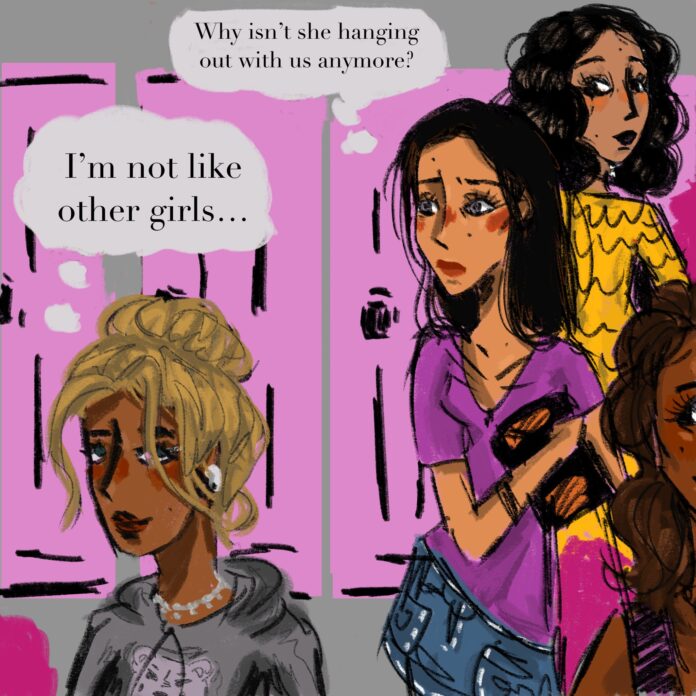There are many issues overlooked in today’s society, and one of them being internalized misogyny. Most people have heard it in passing, but have they stopped to think about the importance and scale of this issue?
Internal misogyny is not an uncommon societal issue, contrary to popular belief, but an issue that surrounds us all. It is a quiet, but destructive force, that lurks in the back of people minds, shaping their perception, choices, and self-worth without even realizing it.
It whispers doubts into the minds of young girls, making them question their worth or even abilities. Some girls end up projecting their insecurities unto others just to find a little comfort in themselves as a result of internal misogyny.
Though this issue affects all age groups, it thrives the most amongst teenagers who are still discovering themselves and who they want to be. It shapes their growing minds while it is still can. Studies show that teenage girls often see each other as competition instead of finding allies in one another. This can often lead to jealousy, insecurity, and the lack of girlhood.
“I think girls would support each other more if we focused on building each other up instead of comparing ourselves.” – Anonymous ICSA student
What is Internal Misogyny?
Internal misogyny is the term used when a woman subconsciously adopts sexist behavior towards themselves and other women due to society. Self-doubt creeps in when a girl feels she is being “too emotional” to be taken seriously. It is the unexpected judgment when a girl labels another girl as “attention seeking,” for wearing revealing clothes.

It is women believing that men are naturally better leaders, more competent, and more rational in leadership roles. This comes in many shapes and forms. Families, and even media, drill misogynistic ideas into girls’ heads. People often normalize these ideas and refer to them as traditions.
I conducted a survey where people defined this term in many different ways. Some believe that international misogyny is “Women/girls adopting sexist beliefs or biases and then projecting it onto other women.” Others believe that “Internalized misogyny is when girls or women believe negative ideas about themselves and other woman because of societal stereotypes.”
Some even went as far as to say it is: “When females accept their assigned roles in a patriarchal system and feel that their worth and value comes from fulfilling those roles.”
All those responses are correct. Some capture the essence of the issue, while others derive a bit. However, they all share something in common: they describe internal misogyny as sexist ideas taught by society, emphasizing the depth of the issue.
Early Seeds of Internalized Misogyny
From a young age, people teach girls, both directly and indirectly, that they need to fit into specific roles. Phrases like ‘girls should be quiet and well-behaved’ or ‘a girl who argues is bossy’ are often used by those around them. These aren’t just random words; they’re ideas that stick in girls’ minds and shape the way they see themselves and others.
A girl might hear her mother say, ‘Women aren’t as good at math compared to men.’ She might also notice a teacher calling on boys more often. Over time, she absorbs these messages, thinking her intelligence is limited compared to boys. Even if these comments aren’t harmful, they plant seeds of doubt in girls’ minds. These seeds grow into sexist ideas over time. Because of these comments, she might believe Math or Science isn’t for her. There’s no real reason for this belief, except the constant words fed to her from childhood.
“Sometimes when I’m just minding my own business, other girls give me a look and I get intimidated because I’m already insecure” – Anonymous ICSA student
Even within friendships, internalized misogyny shows up in harmful ways. Some girls distance themselves from their friends to seek male validation. They often say, ‘I’m not like other girls’ or ‘I’m one of the guys,’ as if being feminine is shameful. People label these girls as ‘pick me,’ those who try to differentiate themselves from others for male attention. This mindset suggests that to stand out, a girl must reject her femininity. It also pits girls against each other, making them see each other as competition.

Effect on Confidence
The confidence gap is the clearest way that young girls’ confidence has been affected by internal misogyny. From an early age, girls absorb the idea that they are less capable, less intelligent, or less suited for certain roles. These ideas mostly come from important female roles in their life, like their mom, aunt, or even older girls on social media. It has been proven that young girls take example from the women around them growing up. The actions of these influential women affect them, whether intentional or not. For example, girls that grew up with brothers might have experienced different treatment based on gender.
Girls could have seen their mother encourage their brother to be bold and take a stand while telling them to be quiet. Over time, misogynistic phrases or even ideas, make girls feel like their opinion doesn’t matter. This could cause girls to have to work twice as hard to prove themselves capable.
A survey participant shared,
“I used to think I wasn’t good at leadership roles because I didn’t see many female leaders around me. It wasn’t until I actively challenged this idea that I realized how much potential I was ignoring in myself.” – Anonymous ICSA student
This shows us the immense importance of positive and encouraging role models in young girls’ lives.
Social media plays a role in internal misogyny, with young children using apps like TikTok and Instagram. Many trends feature influencers pushing unrealistic beauty standards, toxic comparisons, and harmful stereotypes. Constant exposure to negative content leads young girls to believe or adopt these ideas. Misogynistic content not only makes women feel bad, but also encourages them to shame other girls who don’t fit the standards.
We Can Stop Internalized Misogyny
Internalized misogyny thrives in silence, hidden in the unspoken judgments we make about ourselves or other women. It manifests as quiet self-doubt that creeps into our thoughts before we even realize it. Internalized misogyny causes women to second-guess their abilities or judge another girl for being ‘too much.’ It’s deeply embedded in our thinking and often goes unnoticed, making it even more dangerous.
It doesn’t have to be this way. Women can start by acknowledging the harmful beliefs that they’ve been taught. We can start seeing other girls as allies instead of competition, and recognize our own worth beyond the comparisons we have been taught to make. It is possible for us to create a culture where girls grow up feeling strong, capable, and valued. However, in order to achieve this culture, we need to change the way we think and act towards each other.
The next time you think, ‘She’s trying too hard,’ or ‘She’s begging for attention,’ stop. Ask yourself, ‘Where did that thought come from? Do I want someone to think or say this about me?’ Challenge it. Push it away. The fight against internalized misogyny starts with changing how we see ourselves and each other.



This is so well written!!